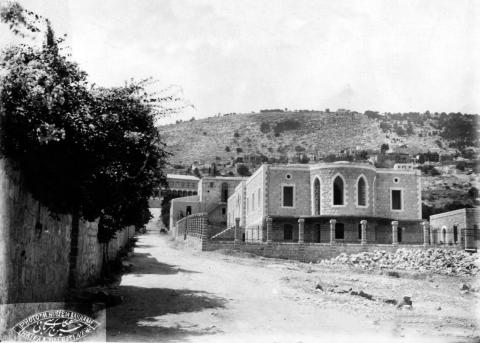Now, people have asked, “Did the Guardian have any conception that he was going to pass away? Did he have fore-knowledge, being divinely guided, that he was going to pass away? Again, friends, the answer to the question is that we don’t know. The preponderance of evidence seems to be that he did not know, that he did not expect to pass away. But, I give you these incidences. They are very sad, but I think you should know and would want to know them.
One evening Shoghi Effendi came over, and he was rather,
, hadn’t been well. He was rather disturbed, badly disturbed, in fact. And he sat down, pushed his plate aside, and Rúhíyyih Khánum said, “Shoghi Effendi, won’t you eat? You haven’t eaten all day. You’re hungry. You’re getting weak. You should eat. And then you can talk to the friends later about your cablegram and the matters you want to talk about.” So he said, well, all right, and he pulled his plate back and the servant gave him some food. He ate one or two mouthfuls, and then he pushed it back and started to talk. Well, Shoghi Effendi, we who lived there got to knew if Shoghi Effendi was well or if he was happy, just your whole life was around that of Shoghi Effendi. And if he was well, you got up in the morning and everything was fine. If he was happy, everything was sunshine. Sometimes you got up in the morning and everything was wrong. Why was it wrong? You didn’t know, but you found out during the day that Shoghi Effendi wasn’t well. So this is when he pushed his plate aside, again without eating, and he started to talk. And he said, “You know, shortly before Bahá’u’lláh passed away, the Master went to see him in Bahji, and He went up to His room and He found His papers all over the floor. So the Master collected them, put them in a neat order, laid them on a divan, and said, Bahá’u’lláh, I collected your papers and put them in order, and I’ve put them out here so that you can have them. Bahá’u’lláh took them in His hands and threw them all over the floor again and said, “It doesn’t make any difference. It’s all done.” I don’t want to these papers any more. No more papers!” That was said before Bahá’u’lláh passed away. So, he said, when ‘Abdu’l-Bahá, shortly before ‘Abdu’l-Bahá passed away (‘Abdu’l-Bahá was always very meticulous in everything He did), and they found His papers scattered around in His room, and his secretaries collected them and put them in order for Him put them together and they took them to ‘Abdu’l-Bahá who took the papers and threw them and said, “I’m done with the papers. It doesn’t make any difference now. It’s all finished now. I don’t want any more papers.” And shortly after, He passed away.
He said, “I’m so tired of these papers, I don’t want them anymore. I just don’t want these papers any more. I don’t want them.” Well, we talked to Shoghi Effendi and said, “Don’t talk that way! How can you say these things! You are going to kill your friends here.” And I said to Shoghi Effendi, “Why don’t you give these papers to Rúhíyyih Khánum and myself. Give them to us. We’ll do something with them. We’ll handle them. We’ll digest them. We’ll give you an outline, and so all you have to do is give us the answers, so that if a person raises a question, we’ll give it to you, and all you have to do is say, “Tell him so-and-so. Tell him so-and-so.” And I said, “Shoghi Effendi, no Guardian of this Cause in the future is going to be able to do what you’re doing. No Guardian can receive all these people and give them personal audiences, give them personal contact and answer personal questions, and deal with the personal problems. I said, they have to in the future deal through the intermediaries. Why don’t you just set up now to have an audience with the pilgrims, one hour in the afternoon. Just one hour. Talk to everyone, have a general talk, and then it’s all finished and you can have a little time, so you can rest a little bit, so you won’t have so many burdens, and you’re not so pressed So I talked along that line and Shoghi Effendi said, “Well, it is not time for any change now.” And that was it.
